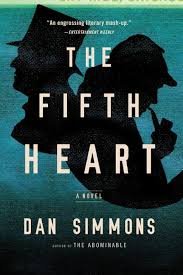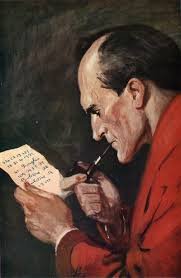The Fifth Heart
I read “The Fifth Heart” because it was written by Dan Simmons whose work I like and respect as well-researched and well-written historical fiction. Barnes & Noble shelves his books in the horror section, but not all of his books are in the horror genre. “The Fifth Heart”, “Abominable” and “The Terror” are, in my opinion, historical fiction. There is some horror in” The Terror”, but none in “Abominable” and none in “The Fifth Heart”.
One of the two main protagonists in “The Fifth Heart” is Sherlock Holmes. I’ve only read one of the too-numerous books not written by Sir Arthur Conan Doyle in which Sherlock Holmes is a character. I have avoided them. As a hard-core Sherlock Holmes fan, I think such books are blasphemous.
The other main protagonist is Henry James, an American writer whose life spanned the turn of the 20th Century, 1843 - 1916. He wrote novels, essays, memoirs, books of criticism, travel, biography, autobiography, and plays. He was nominated for the Nobel Prize three times but was never a winner. He “is considered by many to be among the greatest novelists in the English language.” *
Henry James was an expatriate, living much of his life outside the United States. In the book, he is harshly critical of the United States as in this passage describing rural poverty in America.
The farmhouses were of wood and often needed new coats of paint. Some of the barns sagged. It was a tapestry of American chaos overlaid on a layer of poverty; England and Italy and France had more than enough poverty, Henry Adams knew well enough, but it rarely manifested itself as sagging, unpainted, wildly planted chaos. In England—in most of James’s Europe—the old and poor and rundown were picturesque, including the people.
More from James about the U.S.
America was a nation that refused to grow up. It was a perpetual baby, a vast, pink, fleshy toddler, now in possession of some terrible weapons it did not know how to hold properly, much less use properly.
Three main themes run through the book. The book’s main theme is the solving of a cold case; the years-old death of Clover Adams, the wife of Henry Adams. Simmons’s book title derives from a social group, “The Five of Hearts, who first gathered in Washington in the Gilded Age, included Henry Adams, historian and scion of America's first political dynasty; his wife, Clover, gifted photographer and tragic victim of depression; John Hay, ambassador and secretary of state; his wife, Clara, a Midwestern heiress; and Clarence King, pioneering geologist, entrepreneur, and man of mystery. They knew every president from Abraham Lincoln to Theodore Roosevelt and befriended Henry James, Mark Twain, Edith Wharton, and a host of other illustrious figures on both sides of the Atlantic.”**
Clover’s death and questions about its cause are historical facts. The death was thought by everyone to have been suicide. In “The Fifth Heart”, Clover’s brother, Ned Hooper, unbeknownst to Adams, hires Holmes to uncover the truth of Clover’s death. Hooper does not think Clover’s death was a suicide.
Another theme is the unlikely friendship between Holmes and James, which James fights against.
“No, Nowhere near certain,” agreed Holmes. “But for the time being, I should take no chances with my friends’ well-being.”
Henry James
Something about that phrase—” my friends”—made James feel warm inside. And he hated himself for feeling that way. He certainly had not included this Sherlock Holmes person in his rigidly vetted and constantly reviewed list of friends, and for Holmes to suggest that their association had reached that plane was pure presumption.
Yet James still felt the warm glow.
James over the years built a rigid persona that he guarded closely. He is uptight, closed, repressed; wanting no risks and no new experiences. He struggles unsuccessfully to avoid the friendship in spite of the benefits of drastic engagement that he fully recognizes but shuns.
This strange night in this strange city, James felt younger, stronger—more alive—than any time he could remember, at least since childhood.
Drastic Engagement. [emphasis is Simmons’s] These were words that now echoed through James’s mind. Not merely a reinvigorated engagement with the stuff of daily life, but an engagement with the dangers and dramas outside any life he’d ever allowed himself to imagine, much less live. . . . Drastic Engagement: James suddenly understood why such moments were life to Sherlock Holmes and why the detective had to resort to injections of cocaine or morphine or heroin to get through the dull, backwater days of the quotidian between dangerous cases.
Simmons's portrayal of Sherlock Holmes gave him characteristics not mentioned in Conan Doyle's original stories. In “The Fifth Heart”, Holmes has extraordinary and daring, acrobatic skills. The original Holmes possesses nothing like such acrobatic skills. He is also addicted to heroin. In the Conan Doyle stories Holmes uses drugs, not heroin but a 7% solution of morphine, and never in a way that affects his skills as a private detective. In “The Fifth Heart”, Holmes is addicted and his addiction negatively affects his investigating skills. His need to obtain enough heroin places him in dangerous and compromising situations. I don’t think Conan Doyle's Holmes would ever allow himself to become addicted if doing so diminished his talent.
Sherlock Holmes
But . . . he solves the mystery. Of course!
Here is Holmes dealing with his heroin addiction by using morphine, a temporary expedient:
. . . and then he injected the morphine into the vein at the crook of his inner arm. There were dark marks and scabs showing many, many earlier injections there.
Holmes sat on the edge of the bathtub until the morphine began to work on his pain and panic.
Conan Doyle’s Sherlock Holmes never panicked.
“A habit I abandoned after my friend Dr. Watson convinced me that—how did the good doctor put it?—that the game was not worth the candle.” Holmes saw no reason to mention his morning injection of this more powerful heroic drug [heroin, more powerful than morphine} or the fact that he planned to inject it twice more before this day was over.
Mark Twain comments on Holmes’s bad habit (i.e., addiction):
. . . the only way to break one bad habit was by replacing it with an even worse habit . . .
The thrid theme is that Sherlock Holmes wonders if he is real or fictional. Samuel Clemens seems to take Holmes's concern about being a fictional character seriously:
Clemens leaned even closer to the detective. “The question is simply this, sir . . . are you real, or are you a fictional character?”
Sir Arthur Conan Doyle toyed with the idea of an alternate reality for fictional characters in the Preface to “The Casebook Of Sherlock Holmes”
One likes to think that there is some fantastic limbo for the children of imagination, some strange, impossible place where the beaux of Fielding may still make love to the belles of Richardson, where Scott’s heroes still may strut, Dickens’s delightful Cockneys still raise a laugh, and Thackeray’s worldlings continue to carry on their reprehensible careers. Perhaps in some humble corner of such a Valhalla, Sherlock and his Watson may for a time find a place, while some more astute sleuth with some even less astute comrade may fill the stage which they have vacated.
I did some research for this essay. As I did so, I discovered more and more historical facts and characters that Simmons weaves seamlessly with the fictional parts of the book. Almost all the main characters are actual, historic figures. They are from the heights of political, social, and literary circles in Boston and Washington, D.C. John Hay, William and Henry James, Samuel Clemens/Mark Twain, Alexander Agassiz, Lewis Carroll, Oliver Wendell Holmes, Jr., Henry Cabot Lodge, Adlai Stevenson, Sr., William Dean Howells, Theodore Roosevelt.
I have a single, minor quibble about the book. That is that Simmons uses a deus ex machina when James wanders into a dangerous and deserted part of Chicago and is about to be set upon by four thugs with clubs. Suddenly a policeman appears out of nowhere, in the after-dark haze surrounding the stockyards, and saves the day. Maybe this is unfair. What novelist who writes adventure stories or thrillers does not use deus ex machinas? I enjoyed “The Fifth Heaert”, “Abominable,” and “The Terror” enough that I will surely read more of Simmons’s work.
I’ll use a deus ex machina to end this review simply by saying
The End.
P.S. Here is a statement by Holmes: from “The Fifth Heart.”
Teachers are the most underappreciated and least recompensed of all our esteemed professional classes . . . [p. 487]
*Wikipedia contributors. "Henry James." Wikipedia, The Free Encyclopedia. Wikipedia, The Free Encyclopedia, 22 Aug. 2024. Web. 16 Sep. 2024.
**From the description on the Simon & Schuster website of “The Five Of Hearts” by Patricia O'Toole


